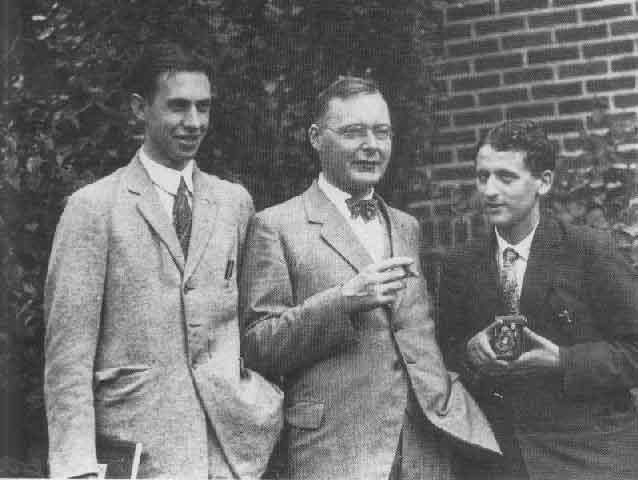.
Hendrik Anthony Kramers

George Uhlenbeck, Hendrik Kramers, and Samuel Goudsmit around 1928 in Ann Arbor.
Hendrik Anthony Kramers (Rotterdam, February 2, 1894 – Oegstgeest, April 24, 1952) was a Dutch physicist, who was generally known by the first name Hans. Hans was the son of Hendrik Kramers, a physician, and Jeanne Susanne Breukelman. On October 25, 1920 he was married to Anna Petersen. They had three daughters and one son.
In 1912 Hans finished secondary education (in Dutch: HBS) in Rotterdam, and studied mathematics and physics at the University of Leiden, where he obtained a master's degree in 1916. Kramers wanted to obtain foreign experience, but his first choice, Max Born in Göttingen, was not reachable because of the first world war. Because Denmark was neutral in this war, as was The Netherlands, he travelled (by ship, overland was impossible) to Copenhagen, where he visited unannounced the then still relatively unknown Niels Bohr. Bohr took him on as a PhD student and Hans prepared his dissertation under Bohr's direction. Although Kramers did most of his doctoral research (on intensities of atomic transitions) in Copenhagen, he obtained his formal Ph.D. in Leiden (on May 8, 1919).
After working for almost ten years in Bohr's group and becoming an associate professor at the university of Copenhagen, Kramers left Denmark in 1926 and returned to his native land. He became a full professor in theoretical physics at the university of Utrecht. In 1934 he left Utrecht and succeeded Ehrenfest in Leiden. From 1931 until his death he held also a cross appointment at the Delft University of Technology.
Kramers was one of the founders of the Mathematisch Centrum in Amsterdam. He won the Lorentz Medal in 1947 and Hughes Medal in 1951.
Kramers lends his name to the Kramers crater on the Moon, the Kramers-Heisenberg formula, the Wentzel-Kramers-Brillouin approximation, the Kramers-Kronig relation, Kramers-Wannier duality, the Kramers model for polymer chains, Kramers-Anderson superexchange, and Kramers' degeneracy theorem.
Master of modern physics: the scientific contributions of H.A. Kramers, D. ter Haar
References
Max Dresden, H.A. Kramers - Between Tradition and Revolution, Springer (1987) ISBN 0387962824
Links
* H.B.G. Casimir, Kramers, Hendrik Anthony (1894-1952), in Biografisch Woordenboek van Nederland. ) (in Dutch)
* J.M. Romein, Hendrik Anthony Kramers, in: Jaarboek van de Maatschappij der Nederlandse Letterkunde te Leiden, 1951-1953, pag. 83-91.
Retrieved from "http://en.wikipedia.org/"
All text is available under the terms of the GNU Free Documentation License

